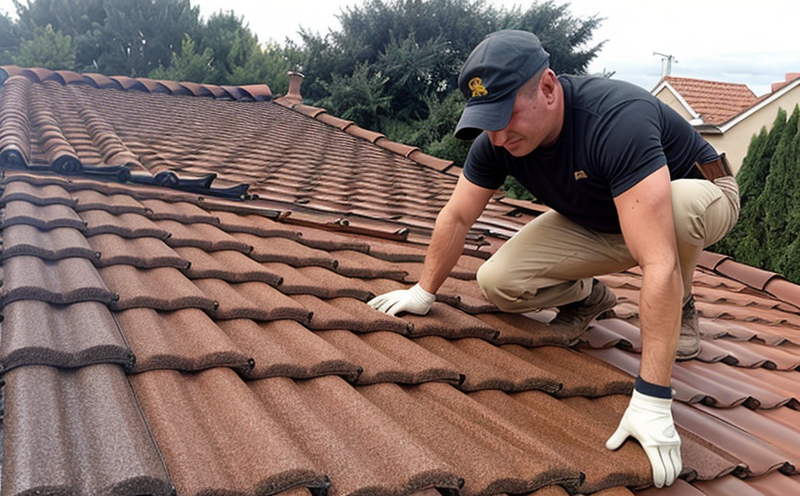Rooftile Installation Inspection
Roof tile installation inspection is a critical phase in the construction and building process. This service ensures that roofing materials are installed correctly, securely, and to meet all relevant standards and specifications. Proper installation of roof tiles plays a pivotal role in enhancing the durability, energy efficiency, and aesthetic appeal of buildings.
The integrity of roof tiles can significantly impact the overall performance of a structure by protecting it from external elements such as rain, wind, snow, and UV radiation. Ensuring that these materials are installed correctly is vital for maintaining long-term structural integrity, reducing maintenance costs, and extending the life cycle of roofing systems.
The inspection process involves several key steps to guarantee quality installation:
- Visual inspection of tiles for any defects or damage before installation.
- Checking the flatness and alignment of the roof surface where tiles will be placed.
- Ensuring proper spacing between individual tiles to allow water drainage effectively.
- Securing each tile correctly using appropriate fasteners, such as nails or adhesives.
- Verifying that the flashing and coping around chimneys, skylights, and roof edges are installed properly.
Accurate installation of roof tiles is not only about aesthetics; it also ensures a watertight seal to prevent water infiltration. This can lead to costly repairs or even structural damage if not done correctly. Proper inspection helps in identifying any issues early on, ensuring that they are addressed before the roof becomes operational.
During inspections, various tools and equipment may be used depending on the complexity of the project:
- Rodent-proofing devices to ensure that pests do not damage the tiles over time.
- Waterproofing compounds or membranes applied beneath the tile layers for added protection against moisture intrusion.
The importance of this service cannot be overstated. Not only does it contribute significantly to a building's longevity but also ensures compliance with local and international standards, thereby protecting the investment made in the construction project.
| Applied Standards | Description |
|---|---|
| ISO 10625:2013 | Specification for flat roofing using prefabricated units such as tiles, slates, or similar products. |
| EN 12087-1:2004 | Performance requirements and test methods for roof coverings – Part 1: Flat roofs with mineral wool insulation. |
| ASTM D3946-11 | Standard specification for lightweight concrete roofing shingles and tiles. |
The use of these standards ensures that the installation process adheres to best practices, providing a robust foundation for long-term performance. Proper inspection helps in identifying any deviations from these standards early on, ensuring timely correction and adherence to quality benchmarks.
Why It Matters
The importance of roof tile installation cannot be understated as it affects several critical aspects of a building's performance:
- Durability: Properly installed tiles enhance the longevity of the roof, reducing the need for frequent replacements.
- Energy Efficiency: Effective drainage and protection against harsh weather conditions contribute to better insulation and energy efficiency.
- Aesthetics: Correct installation ensures that the roof maintains its intended appearance, contributing positively to the overall look of the building.
- Waterproofing: Ensuring a watertight seal helps prevent water damage and extends the life of both the roof and the building's interior.
- Maintenance Costs: Proper installation minimizes future maintenance costs by avoiding issues such as leaks or structural damage.
The primary goal is to create a resilient roofing system that not only meets but exceeds expectations in terms of performance, durability, and aesthetics. This service ensures that every aspect of the roof tile installation process adheres strictly to established guidelines and best practices, thereby providing a reliable and efficient solution for building owners and managers.
Frequently Asked Questions
The integrity of roof tiles can significantly impact the overall performance of a structure by protecting it from external elements such as rain, wind, snow, and UV radiation. Ensuring that these materials are installed correctly is vital for maintaining long-term structural integrity, reducing maintenance costs, and extending the life cycle of roofing systems.
The inspection process involves several key steps to guarantee quality installation:
- Visual inspection of tiles for any defects or damage before installation.
- Checking the flatness and alignment of the roof surface where tiles will be placed.
- Ensuring proper spacing between individual tiles to allow water drainage effectively.
- Securing each tile correctly using appropriate fasteners, such as nails or adhesives.
- Verifying that the flashing and coping around chimneys, skylights, and roof edges are installed properly.
Accurate installation of roof tiles is not only about aesthetics; it also ensures a watertight seal to prevent water infiltration. This can lead to costly repairs or even structural damage if not done correctly. Proper inspection helps in identifying any issues early on, ensuring that they are addressed before the roof becomes operational.
During inspections, various tools and equipment may be used depending on the complexity of the project:
- Rodent-proofing devices to ensure that pests do not damage the tiles over time.
- Waterproofing compounds or membranes applied beneath the tile layers for added protection against moisture intrusion.
The importance of this service cannot be overstated. Not only does it contribute significantly to a building's longevity but also ensures compliance with local and international standards, thereby protecting the investment made in the construction project.
| Applied Standards | Description |
|---|---|
| ISO 10625:2013 | Specification for flat roofing using prefabricated units such as tiles, slates, or similar products. |
| EN 12087-1:2004 | Performance requirements and test methods for roof coverings – Part 1: Flat roofs with mineral wool insulation. |
| ASTM D3946-11 | Standard specification for lightweight concrete roofing shingles and tiles. |
The use of these standards ensures that the installation process adheres to best practices, providing a robust foundation for long-term performance. Proper inspection helps in identifying any deviations from these standards early on, ensuring timely correction and adherence to quality benchmarks.





